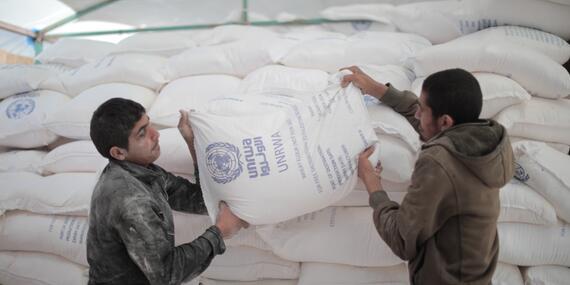Today's top news: Occupied Palestinian Territory, Haiti, Democratic Republic of the Congo, Ethiopia, South Sudan

Gaza is still much less than bare minimum to meet humanitarian needs. Photo: UNRWA
Occupied Palestinian Territory
The UN had planned two humanitarian missions to northern Gaza today, but both were denied access by the Israeli authorities.
One of those missions was meant to deliver 20,000 litres of fuel to run backup power generators at Al Ahli hospital, where medical personnel are still working to provide essential healthcare, despite having no electricity.
OCHA reports that within the past week, more than 40 per cent of aid missions to northern Gaza were denied or impeded, including due to hostilities nearby. Humanitarian missions that had been planned for areas south of Wadi Gaza today were also denied access. Only one mission to areas requiring coordination was facilitated by the Israeli authorities – it provided health support to civilians in Khan Younis.
We and our humanitarian partners continue to do all we can to provide essential humanitarian supplies and services to people in Gaza, wherever and whenever possible.
In his remarks earlier today, Jamie McGoldrick, the acting Humanitarian Coordinator for the Occupied Palestinian Territory, noted that Israel's obligations to facilitate the flow of aid in Gaza do not end at the border.
In order for aid organizations to deliver aid safely throughout Gaza, they must implement the following measures:
- Ensure our facilities and convoys are not targeted,
- Allowing and facilitating access for those convoys, not denying their movements,
- Ensuring that humanitarian missions move quickly and predictably through checkpoints,
- Allowing us to bring in the supplies we need: fuel, trucks, communications equipment.
Haiti
In Haiti, humanitarian colleagues continue to deliver emergency assistance to people affected by the recent violence despite the tense situation.
Yesterday, 11 March, the World Food Programme delivered 19,000 hot meals to displaced in Port-au-Prince and in other provinces, over 200,000 children received a school lunch.
UNFPA and partners continue to support reproductive health, protection services, and hygiene kits in displacement sites in the capital through their mobile clinics. Since 1 March, more than 4,600 hygiene kits have been provided.
Displaced women and girls also received dignity kits which include soap, sanitary pads, a solar lamp, and other basic hygiene items.
UNFPA and their partners also continue to provide remote psychosocial support and information on accessible gender-based violence services through a free hotline operated by their local partners. Since 29 February, more than 340 calls have been made to the hotline.
In the education sector, partners warn that many schools are inaccessible due to widespread violence. Some have been looted or destroyed, while others have been occupied by gangs.
Democratic Republic of the Congo
OCHA is deeply concerned about precarious conditions and escalating threats facing displaced persons in and around the city of Goma, in the east of the country.
More than 500,000 displaced people currently live in displacement sites around the city after fleeing clashes between the Congolese army and a non-state armed group in Masisi and Rutshuru territories, North-Kivu province.
Since early March, several incidents of shelling and accidental grenade explosions in and around displacement sites in Goma have killed 8 people and wounded 34. The proximity of the displacement sites to the frontlines - and the presence of weapons within them - is increasingly putting displaced people at risk.
The humanitarian community reiterates its call to parties to the conflict to respect international humanitarian law and safeguard civilians and humanitarian activities in the displacement sites.
Ethiopia
A High-Level Pledging Event for the Humanitarian Situation in Ethiopia will take place in Geneva next Tuesday, on 16 April.
The event aims at raising international awareness and financial support to address the dire needs and bolster the resilience of vulnerable people in Ethiopia.
It is co-hosted by the UN and the Governments of the Federal Democratic Republic of Ethiopia and the United Kingdom. The Assistant Secretary-General for Humanitarian Affairs, Joyce Msuya from OCHA, will be in Geneva and address the event.
Conflict and back-to-back climate shocks have pushed more than 21 million people in Ethiopia into humanitarian need this year. The lean season (July to September) when 10.8 million people are projected to be critically food insecure is looming large. Yet the country’s UN-backed US$3.2 billion humanitarian response plan is less than 5 per cent funded.
South Sudan
OCHA is concerned about a rise in incidents hampering aid operations in the country.
There have been more than 40 incidents affecting humanitarian access in South Sudan last month, an increase of 13 per cent compared to February. Fifteen of these incidents involved violence against humanitarian staff and impacted humanitarian assets. Other challenges include bureaucratic impediments, movement restrictions, and operational interference. These incidents were most prevalent in Upper Nile, Unity and Jonglei states – with five of six attacks on humanitarian convoys in March reported in Jonglei.
Meanwhile, people fleeing the war in neighbouring Sudan continue to cross the border into South Sudan. Since the start of Sudan’s conflict almost a year ago, more than 636,000 people have arrived in South Sudan – putting further strain on an already underfunded humanitarian response in that country.
This year’s US$1.8 billion humanitarian appeal for South Sudan is just over 19 per cent funded – with only US$345 million received to date.
